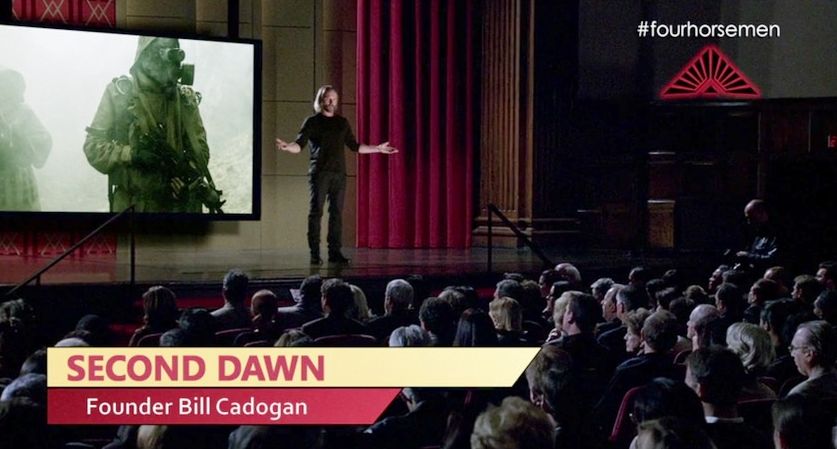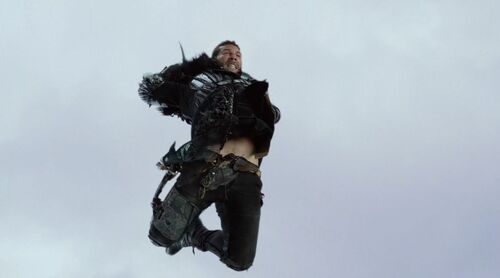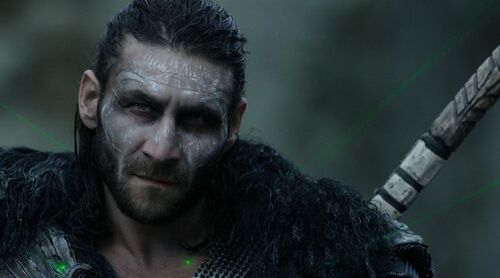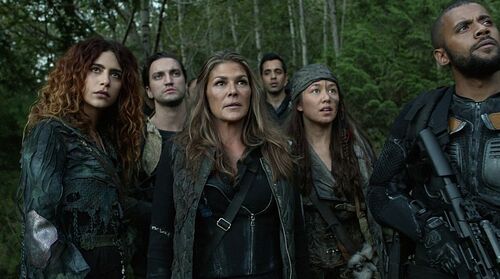
The 100 S4E3: "The Four Horsemen"
 The Four Horsemen continues season four’s inquiry into morality during the apocalypse but does its most interesting work in examining the complexities of some of the show’s foundational relationships.
The Four Horsemen continues season four’s inquiry into morality during the apocalypse but does its most interesting work in examining the complexities of some of the show’s foundational relationships.
A TALE OF THREE HOPES
The structure of this episode is rather simple: three plans unfold simultaneously, each with its own desperate hope.
The First
At the beginning of the episode, Nyko, the grounder healer, and Luna, the last Nightblood, arrive at the gates of Arkadia desperate for help. In tow are the last of Floukru, Luna’s people who lived an isolationist life of non-violence on an oil rig. They’re dying from eating radiated fish. Abby wants to use some of the dwindling supply of anti-radiation medicine to save them, and asks Raven, who is managing supply and rationing, to sanction it. Raven refuses her, and Abby tells her that the deaths of those people are on her. Raven is clearly shaken, and The Four Horsemen doesn’t let up on Raven’s development here. She is forced out from behind her computer screens and schematics to face the human reality of what they are all about to face.
This storyline of The Four Horsemen also cracks open the relationship between Abby and her surrogate children, both Raven and the relative newcomer, Murphy. With Raven, these story beats feel familiar, recalling the scene between Abby and Raven in Human Trials (season 2, episode 5) when Abby confronts Raven about letting Bellamy, Clarke, and Octavia sneak out of what was then Camp Jaha in search of Finn and Murphy. Raven and Abby have always had a complicated relationship, operating as mother and daughter, mentor and mentee, doctor and patient, Chancellor and civilian, and friends. Class complicates their relationship, as Raven grew up in the lower-class section of the Ark with a neglectful, alcoholic mother. Abby was a doctor married to an engineer on Alpha Station, at times serving both as a council-woman and Chancellor. Even their different occupations play a role: Abby is a healer and Raven is a mechanic and engineer.
It’s complicated. Often, it opens up a way for both of them to find understanding in each other as two powerful and big-hearted women. Other times, like in this episode, they butt heads because they are both strong-willed with sometimes conflicting worldviews.
In the end, it’s Murphy who plays the deciding role. Having overheard the first confrontation with Abby and Raven, he steals the anti-radiation medicine and gives it to Abby and Jackson. Murphy and Abby worked together to save Clarke in Perverse Instantiation Part Two, and it’s heart-warming to hear Abby tell Murphy that she worried about him.
Murphy is operating at multiple levels here. At once motivated by his past—his father was executed for stealing medication for him—and also trying to ensure his and Emori’s place on the Ark. If he can ingratiate himself with Abby and prove himself useful to them, they might stand a chance at being saved. He and Emori are survivors, and they need to be “on the other side of that door” to be saved from the storm that’s coming.
As cold and calculated as that is, I don’t think that’s all that’s going on. It means something to Murphy to be included by someone who values him for himself and his skills. The only other person who does that is Emori. Murphy, for all that he’s the survivor-cockroach of the show, is also someone who longs to be included. In season one, he acted that out by being Bellamy’s lackey. In season two, he followed Jaha into the wilderness to find the City of Light. That Murphy, who prides himself on surviving anything, wants most to be included and valued and seen is a lovely, subtle twist of characterization.
At the end of the day, the plan fails. The little girl, Adria, dies, in a harrowing and wonderfully performed scene. Raven enters Med Bay just as this is happening and Murphy keeps her at bay, but nothing can stop Raven (and the others) from watching the scene unfold before her. Any walls she built to keep her going in the face of this disaster simply crumble before the terrible reality before her.
The Second
Roan comes to Octavia with a major problem: someone has taken the Flame from his quarters, and he needs Octavia to find it for him. To his credit, Roan’s a bit sheepish about it, and he billows into the scene wearing a fabulous cloak, but still. All he had to do was to keep the flame safe at the top of a fifty-story tower. How hard could it have been?!
Anyway! Octavia immediately sets off for the Flamekeeper’s temple where she encounters Gaia, who stole the Flame. Just as Octavia is about to run her through with a sword, Indra stops her. We learn that Gaia is Indra’s estranged daughter. Instead of being the warrior and leader Indra trained her for, Gaia is a Flamekeeper scout, devout and religious. Octavia is stunned, but if there’s one thing that Octavia understands the complexity of, it;s family. Besides, they don’t have time to waste. Ilian and a band of looters are outside the temple hunting and destroying tech, and Octavia comes up with a plan to save Gaia and the Flame, even if it means sacrificing the little bit of credibility Roan had as King and Commander.
But the quest for the flame is a device to reveal Gaia and to add a fantastic bit of layering to Indra’s character. It’s the best kind of retcon—Gaia feels a part of this world already, and it enriches Indra and Indra and Octavia’s relationship. Indra, it turns out, has been struggling with having a daughter that rebuffs her ways. Of course, she finds a kindred in Octavia, a young woman of the same age as her daughter, who wants to learn what Indra has to teach. Adina Porter is remarkable here, conveying a mother who is heartbroken for her daughter but willing to do anything so that Gaia survives, even while knowing the high cost of “destroying” the Flame.
More, this adds subtle commentary to Octavia and Bellamy. In that relationship, it’s Octavia who refuses Bellamy’s advice. He’s her parental figure (as well as her brother, only friend for most of her life, and jailor/savior on the Ark—talk about messy intersections), and last season, after learning from his own mistakes he tried to pass on that wisdom. She didn’t listen and killed Pike, and while Bellamy has been trying to find redemption and purpose in saving people and preparing the Ark, Octavia has sought a more violent path. They’re both working for the same common goal, but using extremely different means to do so.
These women won’t be deterred. When Ilian & co. bust in looking for tech, they fool him with a fake flame. He smashes it (in a heart-pounding moment because holy crap, if that was the real flame!) and after the looters leave, Octavia and Indra send Gaia on her way with the real flame. Octavia returns to Roan with the smashed fake flame and the head of some rando. Roan seems suspicious but doesn’t question it.
It’s clear, though, that the specter of the Flame won’t keep the Council united any longer. Only strength and the potential of Azgeda’s brutality can do so now. The plan works, but at the cost of political instability in a time when no one can afford it.
The Third
Through looking at archived material from the Ark, Jaha found a doomsday cult (of course) called The Second Dawn. He is convinced that The Second Dawn’s founder, Bill Cadogan, built a bunker about a day’s ride away from Arkadia. If it’s real, they could save hundreds, maybe thousands more people. Raven is opposed to wasting time and resources looking for it, but Bellamy and Clarke decide to go. Day Trip, anyone?
Last week, Jaha dispensed some leadership advice to Clarke, and in this episode tries to do the same thing with Bellamy. Out of the Rover and looking around the ruins of the cult leader’s childhood home, Jaha tells Bellamy that Clarke is lucky to have him. Leadership is a lonely pursuit but you? You keep her centered, Jaha says. Bellamy dismisses him with a, “You’ve got that backwards.” Bellamy’s lack of self-worth and guilt over his past mistakes is on display, and Jaha, canny human observer that he is, hones in on it.
Still blaming yourself for killing that army? Jaha asks, almost nonchalant. If your intentions were pure, and as long as that’s the truth you don’t need redemption. (I can’t help but be reminded of Jake Peralta from Brooklyn 99—Cool motive, still murder.) Bellamy rejects this too, telling Jaha that frankly—if there’s a hell, he’ll see Jaha there.
Bellamy has plenty of reason to despise Jaha, and to be honest, I wish the show had done more digging into Bellamy’s past like it did to flesh out Clarke and Jaha’s relationship in Heavy Lies the Crown. Jaha was literally a figure in Bellamy’s nightmare hallucinations in the first Day Trip episode (season 1, episode 8), and this scene was ripe to not only provoke Bellamy about his relationship with Clarke and his leadership mistakes but to remind the audience that Jaha perpetuated the systemic abuses of the Ark that required Octavia to be raised under the floor and Bellamy’s mother, Aurora, to be floated. This is essential character development that still has ramifications for Bellamy’s personality and decision-making. Still, having Jaha dole out his own atonement-philosophy tells the audience where Jaha is with his own guilt, and offers Bellamy a philosophy that we see him reject. However, here was more left untouched, at least for now, that could have added more depth to their interaction.
Triangulating Jaha, Bellamy, and Clarke provides an interesting contrast in how both of them take leadership counsel. Clarke is more likely to look to authority figures like Dante, Lexa, and Jaha, for answers when she’s overwhelmed. It makes sense—Clarke grew up in a privileged position on the Ark where Chancellor and Council members were friends of her parents and parents to her friends. From her position, you can trust authority, and she does, but often to her detriment. I bear it so they don’t have to and love is weakness and hope that there’s a forgiving God are platitudes that have been (and most likely will be, in the case of Jaha’s advice) destructive for Clarke. Hopefully her arc this season will be about learning to trust her own conscience as well as the advice of her trusted friends.
Bellamy, on the other hand, grew up in the lower classes of the Ark and suspicious of authority (with good reason). So more often, Bellamy looks to his own internal sense of morality or to people who empathize with him, like Pike and Kane. That has led to its own troubles, like when he acts rashly or when he trusted Pike (a complicated subject matter) but it’s fitting with his character and history. His journey is, like Clarke’s, to find his own way and trust himself, but it’s fascinating how The 100 has set both Bellamy and Clarke up to approach a similar individual arc from two extremely different orientations.
Jaha does note something interesting here—that Bellamy “centers” Clarke (even if Bellamy rejects that notion)—and that’s something that’s notable on the show, as well: the two of them make better decisions when they’re together. Combined, Bellamy and Clarke balance each other out and tend to find their own middle path. That people are outside the relationship are starting to actively comment on it (as opposed to just the narrative) is a new development.
Alas, after all of this character development, the hope of the bunker is drowned in a lake of radiated people goo. Bellamy, with Clarke and Jaha behind him, descends the stairs to find spider webs and skeletons, one of which holds a medallion that has XI engraved on it. Important to note since The New Dawn was based on a system of twelve seals that members advanced through for enlightenment. Bellamy uses the Rover to winch the inner, sealed door open to find nothing but skeletons and nastiness. As the camera pulls back it reveals a note written on a ledge (thanks to Twitter user @skikru for pointing this out!): THERE IS NO SECOND DAWN. BURN IN HELL.
Too bad our heroes didn’t see it.
WE FOUND (HOPE) IN A HOPELESS PLACE (...ONLY A LITTLE SORRY FOR THAT ONE)
Circling back to the beginning of the episode, Raven, Clarke, and Bellamy are arguing about rationing. Raven presses Clarke to make up the list of the one hundred people who will be admitted into the Ark because they need to start preparing them for the day the doors will close. Raven’s absolutely correct here, but making that list is obviously an anathema to Clarke, especially as Raven snaps that choosing who lives and dies is Clarke’s specialty (ouch).
Clarke clings to one last hope—the bunker—and she compromises with Raven. If the bunker doesn’t work out, Clarke will write the list.
Of course, the bunker doesn’t work out. Back in Arkadia, Clarke watches the flurry of activity outside of the Ark and then turns her gaze to a sleeping Bellamy. It’s a peaceful, domestic scene until we realize that what she’s actually doing is writing the list. More, she’s on spot number ninety-nine.
Earlier, Bellamy told Raven and Clarke that he didn’t want to be on the list, and it’s obvious Clarke waited till the very end to put his name on. But she can’t finish the list without saving him—no matter what you think of their relationship, Bellamy and Clarke have always tried to rescue the other—but after she writes his name, she starts to cry. Because hey—maybe Clarke Griffin, who despises herself, wants to be saved too. And what would that mean if Clarke really, truly wanted to live? Not just to save her people, but to save herself? I think the implications of that, especially after the past three seasons, are astounding for her character and I hope the show works more with that in future episodes. But ultimately, Clarke can’t bring herself to write her own name down. She doesn’t feel like she deserves it after the terrible things she’s done.
Bellamy wakes up and comes over, and in a truly gorgeous moment tells her, “If I’m on that list, you’re on that list.” Clarke still can’t do it, and Bellamy takes the pen and writes her name for her.
I can see why some people don’t want to write about Bellamy and Clarke’s relationship, given the shipper wars that infest the fandom. Fortunately/unfortunately, you can’t talk properly about the show without digging into their dynamic. They’re the pivotal relationship, often conveying the season’s themes and theses. Because for all that The 100 is, on its surface, a grimdark sci-fi post-apocalypse show, it’s actually a show that values love, intimacy, and relationships, in all of their complexities. That includes Kane and Abby, Abby and Raven, Murphy and Emori, Kane and Bellamy, Lexa and Clarke, the Delinquents, the Blake siblings, and yes, Bellamy and Clarke.
Clarke and Bellamy are the co-leaders, and heroes of the show, and typically in adventure shows denoting heroes means that these characters are Strong! Decisive! and Bad-ass! Which Bellamy and Clarke are, but they are also very messy and vulnerable. It’s easy to pick one out as the hero and deny or vilify the other for their weaknesses, but both of them are flawed. They both make poor decisions. They struggle with their self-worth, with the burden on them as individuals and as co-leaders, with their own tragic histories and present, apocalyptic course.
That the audience doesn’t see the true vulnerabilities of either Clarke or Bellamy unless they are with the other is telling, like in Day Trip, We are Grounders Part Two, Hakeldama, Join or Die, or the last scene of this episode. Clarke has reserved breaking down and crying for her mother, and only a few times (Remember Me and We are Grounders Part Two)—even then, she’ll stop herself to keep doing what needs to be done.
This time is different. Clarke is struggling in a way we haven’t seen before. Clarke has told Bellamy several times that she needs him and they need each other, and this time by writing her name down Bellamy tells her: I need you, we need you, and you deserve to be saved. In We are Grounders Part Two, at the gate, Bellamy tried to get Clarke to come inside by offering her forgiveness, by telling her that they could get through what had just happened to them in Mount Weather. The subtext of what he was saying was clear: I need you, we need you. Then, crushed under what she had just done, with no hope for herself, she walked into the wilderness. She didn’t deserve to go inside; she didn’t deserve to live with her community after what she had done.
This time, Clarke asks Bellamy, what do they do now? Now we put it away and hope that we never have to use it, he says. Clarke seems struck by the notion of hope, especially at this moment, and asks him if he still has hope. Are we still breathing? Bellamy responds. Then he gives her shoulder a squeeze, which she returns with a sweet hand hold, another signpost of their deepening intimacy. Bellamy tells her to get some sleep and leaves. Clarke takes the list, with her name on it and puts it away.
It’s another instance of together for Bellamy and Clarke, and that together is the show’s thesis statement on both relationships and leadership. Together, Bellamy tells Clarke in Mount Weather. We survive together, Monty says to Octavia in Nevermore. She’s lucky to have you, Jaha says to Bellamy, leadership is a lonely pursuit. No one can go it alone, The 100 tells us. People are messed up and relationships are complex, often imperfect things, but love, vulnerability, and intimacy give us the strength to survive. Together, Bellamy and Clarke—and all of them—might just make it.
REVIEW
We’re three for three on excellent episodes for The 100 season four. The Four Horsemen had similar narrative beats to Heavy Lies the Crown but with different characters making the hard choices, revealing different and opposing philosophies about how people should live in the end times.
My only real complaint is the pace, an uptick from last week which made some character beats seem cut short. Like I addressed above, there was more to mine in Jaha and Bellamy’s relationship, even more to explore with them as a trio. The history there runs deep, and the show is at its best when all of those layers are activated.
The score for The Four Horsemen added depth and excitement. Two scenes stood out: the uplifting, adventurous tension when Bellamy, Clarke, and Jaha were investigating the bunker and the emotional, complex theme underlying the list scene between Clarke and Bellamy, flowing into Clarke putting away the list and walking to Med Bay. The choice to use background silence in the forest, beyond conveying that the insects were dead, provided an excellent contrast to Jaha and Bellamy’s talk.
The cast is always spectacular and there is no way to pick a favorite this week. Nadia Hilker as Luna made me cry with her palpable, wrenching grief at losing the last of her people. Adina Porter (Indra), Tati Gabrielle (Gaia), and Marie Avgeropolous (Octavia) were fantastic in Polis. Those three had an immediate familial chemistry, and I can't wait for Gaia to return. Lindsey Morgan, Paige Turco, and Richard Harmon absolutely knocked it out of the park as Raven, Abby and Murphy. Last but not least, Bob Morley and Eliza Taylor keep bringing more depth to Bellamy and Clarke, holding the center even as their characters struggle. The cast is, as in seasons past, one of the most underrated ensembles on TV right now.


